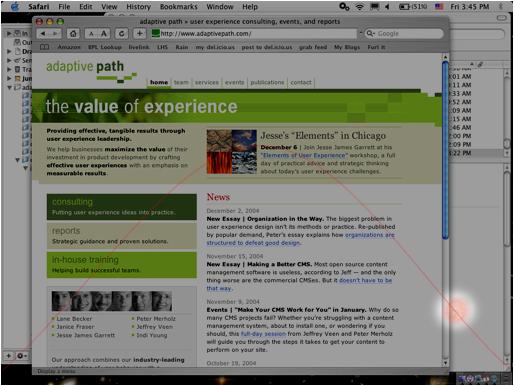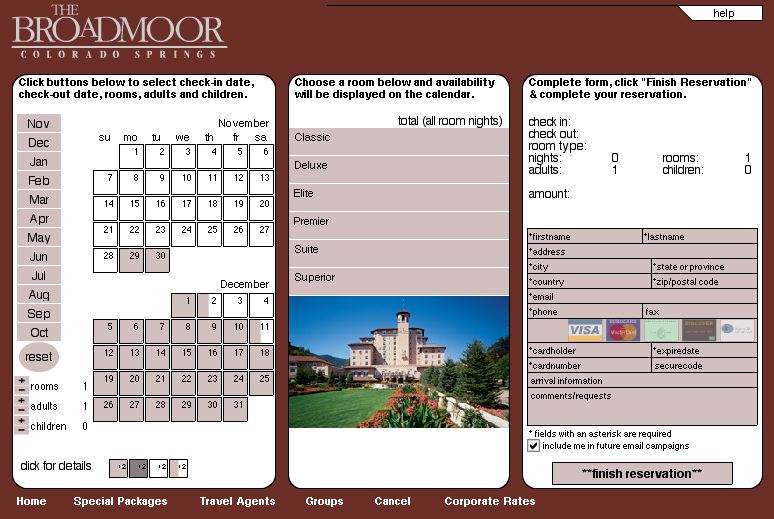December 03, 2004
My new favorite thing: The Sun
So, a couple of weeks ago, I downloaded Konfabulator. It's a system that allows you to place all kinds of tools and widgets on your computer, and access those tools without having to launch applications.
There seem to be any number of practical uses, none of which interests me. What I've gotten the most out of is "Sun." As the description says, "Simulates the motion of the sun across your desktop." That's all it does. And I love it.
Here's a screenshot:

I've muted the bulk of my screen to better highlight the Sun, and I drew a red line that shows its course over a day.
I keep the sun permanently above everything else, but with a lot of transparency so I can see through it to my other stuff. I love having this bit of the "real world" impose itself over my electronic domain. This is the kind of thing that would probably give French critical theorists a field day.
November 30, 2004
BusinessWeek Loves User Experience
The December 6, 2004 issue of BusinessWeek (with the inflammatory "The China Price" cover) is a boon to folks who care about good design in all its components.
The treats:
Pierre Omidyar and eBay
A profile of Pierre Omidyar, founder of eBay. And this phrase:
The Web's real power lies in its ability to connect people instantly around the world, so buyers and sellers alike can share near-perfect information about prices, products, and each other. By putting in place a few key rules, such as a feedback system in which buyers and sellers rate each other, Omidyar sparked a vibrant community that numbers 125 million members worldwide.
It shocks me how few folks get this. How few websites bother to utilize the fact that they reside on a *network*, and that with that network, you can leverage the behavior of all these individuals for both their and your gain. One of those classic "win-win" situations. No retailer other than Amazon really gets it. I can't think of a single marketing communications site that gets it. Almost no online publications get it. It's so basic, yet it requires such a fundamental shift in thinking. The web is only in very small part a "publishing platform", or a "distribution channel." The web is best when it's not top-down.
JetBlue
A book review of Blue Streak just once again highlights that a company that considers customers from top-to-bottom will succeed where others haven't.
Treo 650
The technology columnist loves loves loves the new Treo 650. A product that demands a premium price... because of great design. Jeff Hawkins has infused user-centeredness throughout the company, and this allows Treo to stay ahead of a very very competitive pack.
Upsell
A brief piece on how the iPod is leading to Mac sales.
Reinventing a Company through Design
There's a long feature on Samsung Design, which details how ten years ago, Samsung explicitly shifted its go-to-market strategy to embrace good design as a differentiator. That leads not only to the ability to charge premium prices, but to gain market share as well. Yes! You charge more, AND more people buy it!
The following passage made me laugh out loud (though it's a little... humbling):
Samsung's design focus goes well beyond just the look and feel of its products. The company is working to improve the way people use and control gadgets, and two years ago it opened what it calls a "usability laboratory" in downtown Seoul. There, across the hall from where Choi Won Min taps away at his synthesizers in search of the perfect sound, engineers and consumers alike test everything from getting products out of the box to the icons and menus on screens. "In the past, physical design was the focal point," says Chief Design Officer Choi (no relation to the sound designer). "In the future, the user interface will be emphasized more." (emphasis mine)
Well, now BusinessWeek knows about "usability laboratories," even if it's via a Korean electronics manufacturer, and has nothing to do with them being in place throughout the US for the last 20 years.
And Now For Something Complete Different
Facing the last page of the Samsung article is an ad promoting "Basque Country" as a "strategic partner," highlighting such points as it's "first-class financial sector," "a powerful, dynamic industry" (of what?), "modern infrastructures" (we've got running water!), and "a business culture of the highest level," (Is that like the highest level on Pacman?).
But my favorite bit is the tagline: "Basque Country: A country on the move", which is a little too much like "Springfield, a city on the... grow!" Except it makes even less sense. On the move? To where? Is it drifting out to sea?
November 29, 2004
Examples of Interaction Design and What's Interesting About Them: #1 In a Series
A couple weeks ago, a friend and I were asked to present on the subject of interaction design. The audience needed primer material. We started out the presentation by walking through some examples of web-based interaction design and explanations as to why they were interesting.
I thought I'd share a few.
Booking Reservations at the Broadmoor. A Flash-based interface that lets you choose dates, pick rooms, and submit payment information all on one-screen.

Why it's interesting:
1. Visitors determine order of importance -- date and then room, or room and then date?
2. You see the ramifications of your choices immediately -- if you want these dates, then you won't get these rooms.
3. You cannot "finish reservation" without having filled everything in -- it doesn't require a trip to the server to receive an error message. This pretty much prevents that error
Is it perfect? No. The color-coding of dates is non-intuitive, adding people or rooms is a bit of a kludge, and it features a dreaded "info-slit" below the picture of the room (only a few lines of text visible, requiring a lot of scrolling).
Still, this site is the best of its kind out there, at least that I know. It's also a couple years old, and as an example is getting hoary... Except that no one (apart from iHotelier's other clients) seems to have followed suit, if my experiences booking airfares and hotel reservations is at all typical. Why aren't we seeing more of this?
Oahspe -- The product of too much nitrous?
She pointed me to this image:

The title page to Oahspe, a sacred text written by a dentist, and credit for the first use of the word "star-ship."
November 28, 2004
Self-serving Social Networks
David Weinberger posted about "Selfless Social Networks," and his thoughts didn't ring true for me. While I agree that the users of these tools aren't predominantly selfish, I don't agree that there's a significantly strong thread of selflessness. I wrote a comment to that post saying that, if anything, these tools tap into our self-serving nature. Self-serving is importantly different from selfish -- selfish implies a total disregard for others, whereas self-serving employs our interactions with others for some personal gain.
I refuse to believe that any but an exceedingly small minority upload photos to Flickr in order "to contribute to a worldwide shoebox of photos that is, by itself, a good thing for all of us to have."
This made me think, Why do I use the social software tools that I use? I mean, *honestly*? I suspect most people, even the social software theorists, have seriously engaged in this introspection.
Flickr.com: Since I use iPhoto as my main photo storage tool, there's got a be a socially-driven reason for using Flickr. There are two: Flickr.com is simply the easiest tool for sharing my photos with lots of people, and without forcing large email-attachment downloads on them. That is probably my primary reason. An event happens, post it to Flickr, and everyone who went to that event, or was interested, can grab the photos. The second is a much more self-serving motive -- "Look at me!" I post from my travels. I post from my activities. Ostensibly to share with my friends, but I have to admit -- it's more about getting a little attention. "Oh, you went to Minnesota?" "Oh, you made fudge?"
del.icio.us: This tool I use very differently than Flickr. Where as Flickr for me is essentially social (and typically with a known group of friends), del.icio.us is primarily personal. This is in part because bookmark management within web browsers is such a disaster -- del.icio.us is simply a better interface to bookmarks than what the browsers have offered us. (Before del.icio.us, I didn't keep web bookmarks). After the act of bookmarking web pages, my next-most-common use is of going back through my bookmarks and reading pages I hadn't gotten around to actually reading. My third most-common use of del.icio.us is tag-surfing. Starting with tags I applied to my bookmarks, I see what other people have tagged with those terms. Now, I don't tag selflessly -- I tag for my own retrieval needs. And I suspect that's true of the vast majority of del.icio.us users. What's so great about the tool is that these self-serving, self-centered tags aggregate into a compelling hive mind. But no selflessness here. Perhaps my least-common use of del.icio.us is as a publishing tool -- putting something in there so that others will find it, something that I don't plan to read again. A very few of my del.icio.us posts fall into this "selfless" category.
Movable Type: What you're reading right now. I've been blogging, in some form or another, since 1998. Blogging is probably among the least... intentful (is that a word?) of the social software tools. You type some words, you post it to a server, people read it (or don't). There's little enforced "community" aspect. And, for me, blogging is probably the single most self-serving activity I engage in. I blog to get attention. I blog so that people know what I'm thinking, and, I hope, appreciate what I'm thinking, and, so, consider me as worth paying attention to. And before del.icio.us, I blogged as a kind of annotated bookmarking tool. So, while I hope that what I blog proves helpful to others, I don't blog *to* help others.
Not that I haven't tried to blog to help others. The Beast Blog, which I started as a community blog, was a much more selfless act on my part. And after about a year, I realized I just didn't care enough any more. I've pretty much stopped posting there. And I think it's because my work there wasn't self-serving enough. I was trying too hard to be a community hub, and that, in and of itself, didn't motivate me.
[now I go on a bit of an unplanned mental wander]
I think that this notion of self-serving social networks might possible play into Dan Hill's thoughts on self-centered design. (Though, you have to Google "self-centred design" to find that link... Google hasn't learned to lump together American and English spellings.) In all things, *I* am at the heart of the system, my needs, wants, desires, capabilities, interests, concepts, understandings, etc.
The social software tools that maximize self-serving behavior with positive community impacts will best succeed. Flickr's inherent nature does that pretty well... But there's a problem when one of your contacts is a bit of a photo junky -- you get overwhelmed with their self-serving use (posting pictures of, say, what they've eaten (I'm looking at you, Jones)), and it interferes with the commons -- particularly active people monopolize screen real estate, much the same was as overactive posters can dominate email lists.
